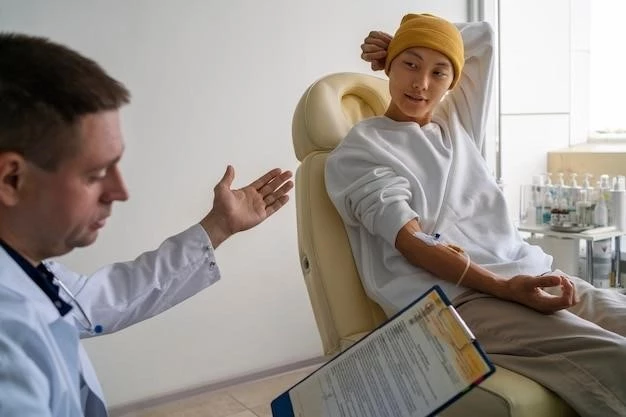Disease ⎼ Lymphoma‚ Large-Cell‚ Immunoblastic
When dealing with lymphoma‚ large-cell‚ immunoblastic‚ it’s crucial to understand the nature of the disease‚ its progression‚ and the available treatment options. Stay informed and consult with healthcare professionals for personalized guidance.
Understanding Lymphoma‚ Large-Cell‚ Immunoblastic
Lymphoma‚ large-cell‚ immunoblastic is a type of malignant cancer that affects the lymphocytes‚ a type of white blood cell crucial for the immune system. It is characterized by fast-growing tumors in the lymph nodes and other tissues. The diagnosis typically involves a series of tests such as blood tests‚ PET scans‚ CT scans‚ and MRIs to determine the extent of the disease.
It is important to understand the role of genetic mutations in the development of this type of lymphoma. These mutations can affect the behavior of the cancer cells and influence the choice of treatment options. Consultation with an oncologist specialized in lymphomas is essential to create a personalized treatment plan.
Having a good grasp of the disease progression‚ treatment options like chemotherapy‚ immunotherapy‚ and radiation‚ and potential side effects is crucial for making informed decisions. Understanding how the cancer affects the immune system and bone marrow can help in managing the symptoms and planning for the future.
Symptoms and Diagnosis
Recognizing the symptoms of lymphoma‚ large-cell‚ immunoblastic is crucial for early diagnosis and prompt treatment. Common symptoms include swollen lymph nodes‚ fever‚ night sweats‚ weight loss‚ fatigue‚ and itching. If you experience any persistent symptoms‚ consult a healthcare professional.
Diagnosing this type of lymphoma involves a series of tests to confirm the presence of cancer cells. These tests may include biopsies of the affected lymph nodes or tissues to examine them for malignant cells. Additionally‚ blood tests‚ PET scans‚ CT scans‚ and MRIs help determine the extent of the disease and aid in developing a treatment plan.
An accurate and timely diagnosis is essential for determining the best course of action. Early detection can lead to more effective treatment outcomes and higher chances of achieving remission. If you notice any symptoms or have concerns about your health‚ seek medical advice for proper evaluation and diagnosis.
Prognosis and Relapse
Understanding the prognosis of lymphoma‚ large-cell‚ immunoblastic is essential for managing expectations and planning for treatment. Factors that influence prognosis include the stage of the disease‚ age of the patient‚ overall health status‚ and response to treatment.
While many patients achieve remission with appropriate treatment‚ there is always a risk of relapse. Regular follow-up appointments and monitoring are crucial to detect any signs of relapse early. Be proactive in discussing any new symptoms or concerns with your healthcare team to address them promptly.

Each individual’s prognosis can vary based on personalized factors‚ making it important to consult with your oncologist regularly to assess your progress and adjust treatment as needed. Stay informed about your condition‚ ask questions during appointments‚ and adhere to the recommended follow-up schedule to maximize the chances of successful outcomes.
Consultation with an Oncologist
When facing lymphoma‚ large-cell‚ immunoblastic‚ scheduling a consultation with an oncologist specialized in treating lymphomas is crucial. An oncologist can provide valuable insights into the specific characteristics of your cancer‚ discuss treatment options such as chemotherapy‚ immunotherapy‚ or radiation‚ and guide you towards the best course of action.
During your consultation‚ make sure to ask questions about the diagnosis‚ treatment plan‚ potential side effects‚ and prognosis. The oncologist can help you understand the benefits and risks of each treatment option and assist you in making informed decisions regarding your care.
Building a strong relationship with your oncologist is essential for receiving personalized and comprehensive care. They will monitor your progress‚ adjust treatment based on your response‚ and provide support throughout your journey. By actively participating in discussions and decisions during your consultations‚ you can play a proactive role in managing your health.
Biopsy and Genetic Mutations
Biopsies play a key role in diagnosing lymphoma‚ large-cell‚ immunoblastic by examining the affected lymph nodes or tissues for cancer cells. This helps determine the specific type of lymphoma and its characteristics. Additionally‚ genetic mutations can influence the behavior of the cancer cells and guide treatment decisions.
Understanding the genetic mutations associated with your lymphoma can provide insights into how the cancer may respond to different treatments. Your healthcare team may recommend additional testing to identify specific mutations that can help tailor your treatment plan for better outcomes.
Consulting with your oncologist about the results of genetic testing and how they impact your treatment options is essential. By being informed about the genetic makeup of your cancer‚ you can work with your healthcare team to choose the most effective therapies and personalized approaches to managing your lymphoma.
Treatment Options
When it comes to treating lymphoma‚ large-cell‚ immunoblastic‚ several options are available depending on the stage of the disease and individual factors. Common treatment modalities include chemotherapy‚ immunotherapy‚ radiation therapy‚ and targeted therapy.
Chemotherapy‚ often used as a first-line treatment‚ involves the use of powerful medications to kill cancer cells. Immunotherapy boosts the body’s immune response to target and destroy cancer cells. Radiation therapy uses high-energy rays to shrink tumors‚ while targeted therapy focuses on specific molecules within cancer cells;
Your oncologist will recommend the most suitable treatment plan based on your specific diagnosis‚ overall health‚ and treatment goals. It’s essential to discuss the potential benefits‚ risks‚ and side effects of each treatment option to make informed decisions about your care.
Achieving Remission
Reaching remission in lymphoma‚ large-cell‚ immunoblastic is a major treatment goal where no cancer cells can be detected in your body. The journey to remission involves undergoing prescribed treatments‚ closely following the healthcare team’s recommendations‚ and diligently attending follow-up appointments.
Chemotherapy‚ immunotherapy‚ radiation‚ or a combination of treatments aim to eradicate cancer cells and achieve remission. It’s crucial to adhere to the treatment schedule‚ manage possible side effects‚ and communicate any concerns with your healthcare provider promptly.
Regular monitoring through imaging tests and blood work helps track your progress towards remission; Celebrate small victories‚ stay positive‚ and lean on your support system during this challenging but hopeful phase. Achieving remission requires patience‚ resilience‚ and active participation in your treatment plan.
Follow-up Care and Monitoring
After achieving remission from lymphoma‚ large-cell‚ immunoblastic‚ ongoing follow-up care and monitoring are crucial to ensure the cancer remains in check. Regular check-ups‚ imaging tests‚ and blood work will help detect any signs of relapse early and address them promptly.
Your healthcare team will establish a follow-up schedule tailored to your individual needs. It’s essential to attend all appointments‚ communicate any new symptoms or concerns‚ and adhere to lifestyle recommendations to support your overall health and well-being.
Maintaining a proactive approach to your follow-up care can significantly impact your long-term health and quality of life. By staying vigilant‚ staying informed about your condition‚ and collaborating with your healthcare providers‚ you can navigate the post-remission phase with confidence and optimism.
